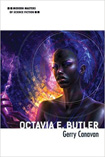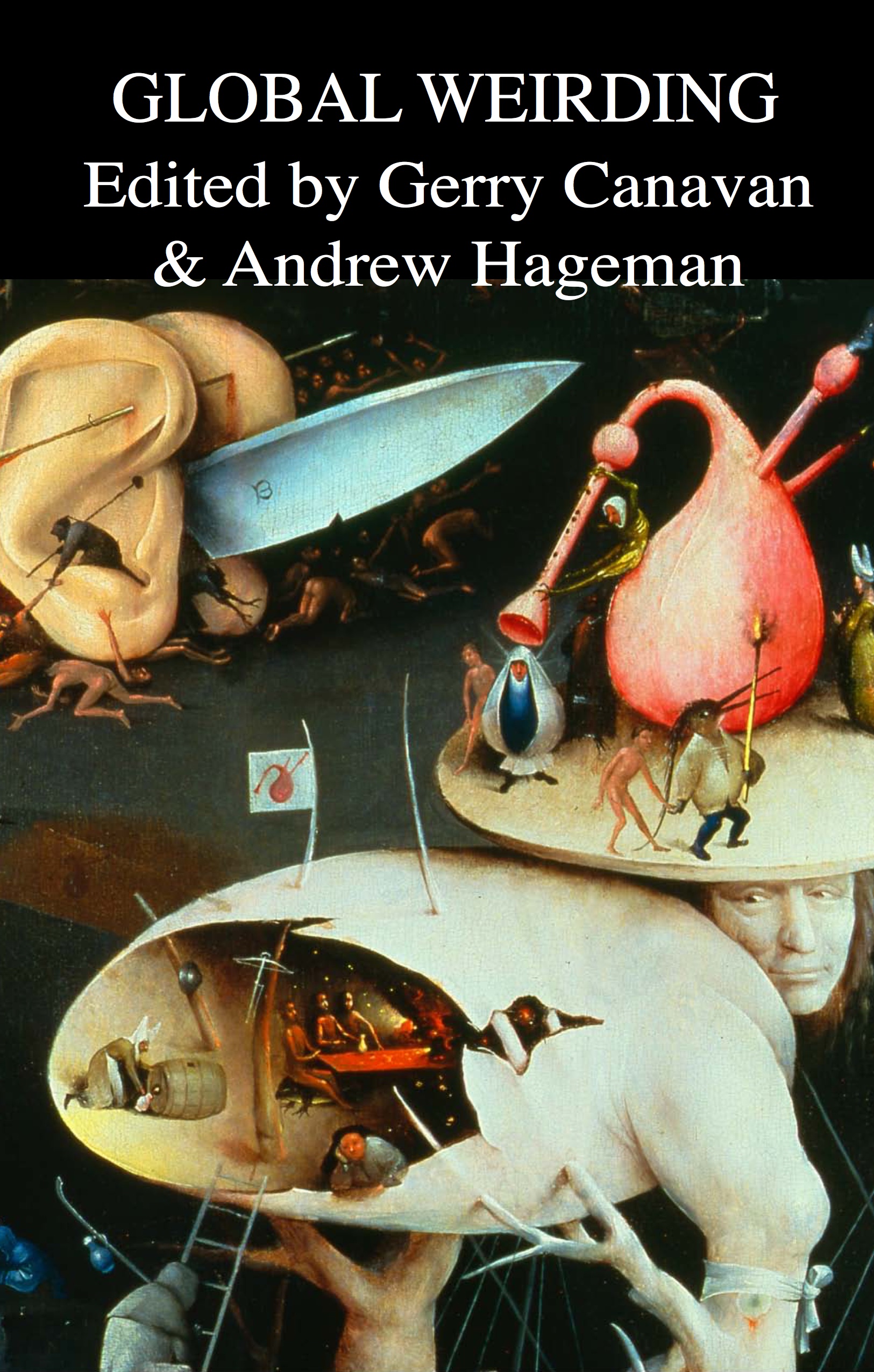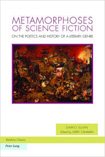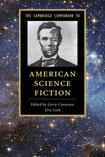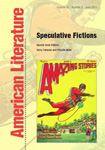Posts Tagged ‘myth’
Notes Towards a Miss Reading of Kimmy Schmidt
Seeing this review of Unbreakable Kimmy Schmidt at the Los Angeles Review of Books has inspired me to finally write up some somewhat idiosyncratic thoughts I’ve had about the series that I haven’t seen reflected anywhere else. (And thanks to the people who have indulged me about this on Twitter, especially @millicentsomer and @evankindley.) I definitely agree with the reviewer that Unbreakable Kimmy Schmidt is a “woman out of time” story, but I really think the interpretive emphasis on “Unfrozen Middle Schooler from the 1990s” should be on “middle schooler” rather than “from the 1990s.” My take is that the 1990s nostalgia is largely driven by the Millennial audience the show is pitching itself at — it’s an engine for jokes but not really the center of the project. “Unfrozen Middle Schooler,” in contrast, is the actual heart of Unbreakable Kimmy Schmidt, at least the way I want to read it as a feminist work.
One of the things I talked about with Lili and Evan on Twitter was whether Kimmy’s abduction is taken seriously as an event or if the bunker is taken seriously as an actual lived environment. Having completed the series now, I still don’t think so: I think “the bunker” essentially functions in the series like being in a coma, or being shot with a Grow-Up Beam, or making a wish to be Big. It’s a magic spell to get Kimmy from middle school to adulthood without having to go through high school and college, which is the source of her power in the series, from her refusal of the usual rules of society to her love of backpacks and bright, mismatched clothing. You can see this utopian imaginary working really clearly in the incredibly infectious theme song, where the removal of the girls from the bunker and a closeup on Kimmy’s ecstatic childlike grin over the lyrics “Unbreakable! They alive, damnit! It’s a miracle!” quickly gives way to a montage of nostalgic, home-video-style images of childhood (and specifically girlhood), which express the same unvarnished joy but also absolute self-confidence (thumb’s up), total mastery of their environment (the dancing, the hula hooping, the monkey bars), and maximum resilience in the face of adversity (the baby plopping down face first).
We return to the in-universe “autotune the news” frame only once during this thirty-second sequence, to be told that “females are strong as hell” — the clear implication to me being that we ought to draw an interpretive connection between the claim of female power and childhood, specifically, girlhood: before sex, before even puberty, before the male gaze, before pervert teachers and abusive boyfriends and quasi-consensual sexual encounters and ubiquitous street harassment and the too-familiar host of other abuses inflicted upon women from the moment they enter young adulthood. What the magic spell of the bunker allows Kimmy to do is pass over the moment in which girls are forcibly conscripted into becoming “women” (somewhat or entirely against their will) and emerge instead as an adult who has not internalized our society’s misogyny or its mean, psychosexual aggressivity. So much of what is delightful about Kimmy is precisely the fact that she has retained the aspirations, expectations, confidence, and general affect of a precocious middle-schooler without having had to temper or diminish herself through unhappy experiences with patriarchy. If the show has a moral or utopian message for women, it’s Let’s all go back to thinking about ourselves the way we did before society told us we were worthless, and it’s a pretty damn good one.
We’ve been working with children’s stories a lot in my “magic as literature” course this semester, and one of the oppositions we’ve really been focusing on (especially as we’ve studied Disney, and Frozen, recently) is the opposition between what mythographers call “the girl’s tragedy” and what we’ve been calling instead the utopia of childhood or (here more directly) the utopia of girlhood. The girl’s tragedy is the female answer to “the hero’s journey,” but the narrative doesn’t work the same way: instead of the boy hero who sets out from home, masters the outside world, slays the dragon, and then returns home to become king, the girl’s tragedy is a story about being ripped from safety and forced to accommodate oneself to the whims of adult men, particularly their sexual urges. The happy ending for the girl’s tragedy — the happiest one available — is that she accepts her role as wife and mother and gives birth to a male son who will then inaugurate the next cycle of heroism; girls and women who refuse to play the proper role are typically cast out of the realm of the human altogether, turned into animals or plants or stars or foam. The utopia of childhood describes those comparatively rare stories that are exceptions, where the girls are neither forced to become mothers nor punished, but allowed to remain what they were without transformation by instead bending the adult world to their will (as in Brave, or Moonrise Kingdom, or arguably Frozen, though in most of these the girl-heroes seem only to buying themselves time rather than enacting a full and permanent transformation of their circumstances).
Of course the utopia of childhood can itself be deeply retrograde, and is frequently misogynistic in its way — we spent a lot of time on “The Problem of Susan” in the Narnia books precisely so we didn’t fall too in love with the impossible fantasy of never growing up (when in the end we all have to). Nor can we safely imagine childhood in such uncomplicatedly rosy terms, both because childhood can also be a time of fierce frustration, competition, and intense pain even when it is not actively shattered through the cruelty and abuse of adults. But all the same there is something undeniably appealing about the idea of returning to a childhood that is both happy and which never gives way to something else, a desire that structures so much of our culture (particularly the middle-class culture of “good parenting”) that it really almost goes without saying. And in the case of Kimmy Schmidt‘s feminist politics of course the idea is not that women find some fantastical way to literally de-age themselves so much as they look to their younger, effortlessly capable and supremely confident selves as inspiration in the present.
There’s one more thing to say about Kimmy Schmidt, which is again about the abduction and the bunker, which would seem to be a rather large problem for my reading of the series. Isn’t Kimmy’s entire situation itself a literalized girl’s tragedy, insofar as she is abducted as a child and put into radical seclusion, all the while being fed obscenely misogynistic lies by a woman-hating male adult? Well, yes! The question of Kimmy’s abduction, and the horrific sexual violence it inevitably implies if thought about too much, is a pretty thorny one for the series: fixated on too much, it threatens to derail any potential for comedy in the show at all. (UPDATE: Someone just sent me Emily Nussbaum’s review, which talks a lot about this issue.) The series cleverly solves the problem by opening the door just a crack — “yes, there was weird sex stuff in the bunker” — and then simply leaving it there. Something happened — perhaps, as Evan suggested in what has become my headcanon, it was all between the girls and not involving the preacher at all — but it hasn’t changed Kimmy, or defeated her. And she emerges from Hell neither pregnant with the monster’s baby, nor transformed into a weeping plant or into sea-foam, but just as unflappable and unbreakable as she was when she went in.
And in any event the treatment of the bunker doesn’t really work the way the ten-second summary of the setup would suggest. The presence of the preacher is actually a further occasion for Kimmy to refuse to internalize her sexist training, precisely because it is now located within a single, odious man against whom she can fight. The button at the end of the first episode demonstrates precisely this: Kimmy proves he is lying to them, he says he’s going to break her someday, and she replies no, he never will. It’s easy to see why, in contrast to the microaggressions and little indignities — alongside the very big ones — that make up girls’ training to be women in our society, which is constantly delivered by parents and siblings and friends and trusted authority figures and widely celebrated mass culture texts, Kimmy’s more direct training in misogyny at the hands of the Reverend never really takes. In the bunker she had an obvious enemy, someone she could tell she was feeding her poison, and so she could reject it. It’s actually outside the bunker where the true brainwashing takes place, which is all the more insidious because it seems like education, like help, like love.
‘Spaghetti Westerns Questioned the Underpinnings of Civilization’
Django Unchained is not so much the evil twin of the saintly Lincoln as its nasty, more clever kid brother, fighting for recognition against the favorite, acting out. If I prefer it to Lincoln it’s because I prefer the Tarantinian project, flaws and all, to Steven Spielberg’s entire career. Lincoln may be the culmination of the Spielberg-Lucas reimagining of the American cinema as family entertainment, a transcendent work beyond the blockbuster form that reimagines the official national myth of an official national father for current and future generations.
Tarantino is more interested in a pre-consolidated cinema that pre-dates Spielberg, in which national myths were put to use in tawdry, violent, and grandiloquent ways, and myth was open to interpretation by genre filmmakers outside the US. So however Tarantino has failed the actual history of slavery in the United States, the way he has opened it up for discussion strikes me as far more remarkable than the storybook of Spielberg’s Lincoln, which closes with a thump and sends us off to bed.
n+1 previews the Oscars. Via Twitter, Jesse Williams has, at length, a somewhat different take on the film.
Slave Rebellions and History
I was talking with Traxus the other day about how slave rebellions mark an interesting difference between knowledge and belief. Everybody who is historically informed knows slave revolts happened, and moreover is perfectly eager to say so—but all the same nobody believes in them. They exist in history only to be bracketed: “Of course, there were slave rebellions, but…”
Two reviews of Django Unchained take this up. First, the New Yorker:
It is precisely because of the extant mythology of black subservience that these scenes pack such a cathartic payload. The film’s defenders are quick to point out that “Django” is not about history. But that’s almost like arguing that fiction is not reality—it isn’t, but the entire appeal of the former is its capacity to shed light on how we understand the latter. In my sixteen years of teaching African-American history, one sadly common theme has been the number of black students who shy away from courses dealing with slavery out of shame that slaves never fought back.
It seems almost pedantic to point out that slavery was nothing like this. The slaveholding class existed in a state of constant paranoia about slave rebellions, escapes, and a litany of more subtle attempts to undermine the institution. Nearly two hundred thousand black men, most of them former slaves, enlisted in the Union Army in order to accomplish en masse precisely what Django attempts to do alone: risk death in order to free those whom they loved. Tarantino’s attempt to craft a hero who stands apart from the other men—black and white—of his time is not a riff on history, it’s a riff on the mythology we’ve mistaken for history.
Second, Jacobin:
It’s a shame, because the history of North Atlantic slave revolts offers up a lot of interesting material. Try this: “For our declaration of independence, we should have the skin of a white man for parchment, his skull for an inkwell, his blood for ink, and a bayonet for a pen.” That’s Boisrond-Tonerre, Jean-Jacques Dessalines’ aide. Tarantino certainly couldn’t write that.
AL:SF
In case you missed it Friday afternoon: the special issue of American Literature I co-edited on “Speculative Fictions” is now up at dukejournals.org.
Announcing American Literature 83.2: ‘Speculative Fictions’!
 Very exciting news: the special issue of American Literature I co-edited with Priscilla Wald is up and available for purchase or download (through subscribing institutions). Here’s a little bit from our preface and a table of contents:
Very exciting news: the special issue of American Literature I co-edited with Priscilla Wald is up and available for purchase or download (through subscribing institutions). Here’s a little bit from our preface and a table of contents:
In this sense SF holds within itself the restless curiosity and relentless drive toward futurity that has characterized theory ever since Karl Marx dedicated his project to “the ruthless criticism of all that exists, ruthless both in the sense of not being afraid of the results it arrives at and in the sense of being just as little afraid of conflict with the powers that be.” Thus has Freedman suggested that SF and critical theory are “each . . . version[s] of the other.” Or, as Ray Bradbury puts it: “That’s all science fiction was ever about. Hating the way things are, wanting to make things different.” Or Le Guin, writing of the Stalinists’ designation of Zamyatin as an “internal émigré”: “This smear-word is a precise and noble description of the finest writers of SF, in all countries.” The equivalent term in the United States, she notes, would be “un-Americanism”—transmogrifying the title of this journal, for this special issue, to something like Un-American Non-Literature. There could be worse things!
…In a world whose basic coordinates are under constant flux from eruptions of ecological crisis to the emergence of genomic science, from the global realignments of religious fundamentalism to the changing parameters of liberation theology, from the ongoing unfoldings of antiracist activisms worldwide to the struggle for LGBTQ rights, the estrangements of SF in all its forms, flavors, and subgenres become for us a funhouse mirror on the present, a faded map of the future, a barely glimpsed vision of alterity, and the prepped and ready launchpad for theory today.
Here then are seven estrangements; seven émigrés; seven ruthless criticisms of all that exists; seven ways to make things different.
Table of Contents
* Mark Chia-Yon Jerng, “A World of Difference: Samuel R. Delany’s Dhalgren and the Protocols of Racial Reading”
* Nathaniel Williams, “Frank Reade, Jr., in Cuba: Dime-Novel Technology, U.S. Imperialism, and the ‘American Jules Verne'”
* Aaron Bady, “Tarzan’s White Flights: Terrorism and Fantasy before and after the Airplane”
* David M. Higgins, “Toward a Cosmopolitan Science Fiction”
* Ramzi Fawaz, “‘Where No X-Man Has Gone Before!’ Mutant Superheroes and the Cultural Politics of Popular Fantasy in Postwar America”
* Robert F. Reid-Pharr, “Clean: Death and Desire in Samuel R. Delany’s Stars in My Pocket Like Grains of Sand”
* Everett Hamner, “The Predisposed Agency of Genomic Fiction”
Final Deadline Approaching: ‘American Literature’ Special Issue on SF, Fantasy, and Myth
American Literature (Duke University Press)
Special Issue on SF, Fantasy, and Myth
http://www.duke.edu/~gc24/americanliterature.html
DEADLINE: 31 May 2010
More than one commentator has mentioned that science fiction as a form is where theological narrative went after Paradise Lost, and this is undoubtedly true…The form is often used as a way of acting out the consequences of a theological doctrine….Extraterrestrials have taken the place of angels, demons, fairies and saints, though it must be said that this last group is now making a comeback.
—Margaret Atwood, “Why We Need Science Fiction”
Fantasy is the impossible made probable. Science fiction is the improbable made possible.
—Rod Serling
In this work I am attempting to create a new mythology for the space age. I feel that the old mythologies are definitely broken down and not adequate at the present time.
—William Burroughs (on the Nova trilogy)
From revolutions in communications technology and transportation to encounters with space travelers and aliens, from leaps in human evolution to new dimensions of existence, from creation stories of the past to speculations about the future, science fiction, fantasy, and myth have variously captured the far reaches of the human imagination, making the familiar strange and the strange inevitable. From the vantage point of the twenty-first century, it is fascinating to watch the rapid innovations in science and technology overtake their fictional anticipation and to return to our most speculative and fantastical literature to see how perceptively it anticipated the social and geopolitical transformations—and challenges—these innovations would inspire. We can, moreover, look through these fictions and recognize in them a prolonged engagement not just with the transient social anxieties of their individual moments, but also with the timeless drama of human contact with the divine, the transcendent, the otherworldly, and the sublime.
This special issue brings together these genres with their divergent but intersecting histories and asks why they might be particularly relevant to study in the contemporary moment. While science fiction has garnered increasing attention in recent years in the academy (and increasing recognition in mainstream publications), the status of fantasy is even more controversial—and the line between them itself a subject of debate. Myth, by contrast, has long been a source of scholarly fascination, although the term typically emerges in the study of American literatures in its pejorative sense. Yet, myth plays a seminal role in the genres of science fiction and fantasy, so much so that science fiction and fantasy can arguably exceed the category of genre to contribute to what William Burroughs calls “a new mythology for the space age.” The issue seeks to move past the definitional debates—beyond, for example, determining the distinction between science fiction and fantasy or the precise definition of myth—to explore broadly the relationship of these genres and modes (individually or in combination) to American literatures and cultures. How, for example, might a focus on science fiction, fantasy, and/or myth change our understanding of literary history? Of literary engagements with scientific and technological innovations as well as with the most pressing political concerns of the moment? How might we use these literary forms to understand genre as a historical repository? The role of mythology in modern culture? What social and geopolitical conditions might produce a genre or mode—or perhaps a critical category that newly classifies certain literary conventions as genres? What themes or questions surface when we read more canonical works through the lens of science fiction, fantasy or myth? Conversely, what happens to these categories when we take seriously, as scholars such as H. Bruce Franklin have done, their early appearance in American literary history? This issue will explore the insights that emerge when we consider the various imaginative engagements that characterize science fiction, fantasy, and myth as central concerns of American literary history and cultural production.
Special issue editors: Priscilla Wald and Gerry Canavan. Submissions of 11,000 words or less (including endnotes) should be submitted electronically at www.editorialmanager.com/al/default.asp by 31 May 2010. When choosing a submission type, select “Special Issue.” Please contact us at 919-684-3948 or am-lit -AT- duke.edu if you need assistance with the submission process. Please direct other questions to Priscilla Wald (pwald -AT- duke.edu) or Gerry Canavan (gerry.canavan -AT- duke.edu).
Both Rings Were Round, and There the Resemblance Ceased
“Both rings were round, and there the resemblance ceased”: Tolkien as Wagner’s shadow.
CFP: American Literature, Special Issue on SF, Fantasy, and Myth
I’m pleased to announce I’ll be co-editing an issue of American Literature next year on science fiction, fantasy, and myth. Here’s the CFP; the deadline is May 31, 2010.
American Literature (Duke University Press)
Special Issue on SF, Fantasy, and Myth
http://www.duke.edu/~gc24/americanliterature.htmlDEADLINE: 31 May 2010
More than one commentator has mentioned that science fiction as a form is where theological narrative went after Paradise Lost, and this is undoubtedly true…The form is often used as a way of acting out the consequences of a theological doctrine….Extraterrestrials have taken the place of angels, demons, fairies and saints, though it must be said that this last group is now making a comeback.
—Margaret Atwood, “Why We Need Science Fiction”Fantasy is the impossible made probable. Science fiction is the improbable made possible.
—Rod SerlingIn this work I am attempting to create a new mythology for the space age. I feel that the old mythologies are definitely broken down and not adequate at the present time.
—William Burroughs (on the Nova trilogy)From revolutions in communications technology and transportation to encounters with space travelers and aliens, from leaps in human evolution to new dimensions of existence, from creation stories of the past to speculations about the future, science fiction, fantasy, and myth have variously captured the far reaches of the human imagination, making the familiar strange and the strange inevitable. From the vantage point of the twenty-first century, it is fascinating to watch the rapid innovations in science and technology overtake their fictional anticipation and to return to our most speculative and fantastical literature to see how perceptively it anticipated the social and geopolitical transformations—and challenges—these innovations would inspire. We can, moreover, look through these fictions and recognize in them a prolonged engagement not just with the transient social anxieties of their individual moments, but also with the timeless drama of human contact with the divine, the transcendent, the otherworldly, and the sublime.
This special issue brings together these genres with their divergent but intersecting histories and asks why they might be particularly relevant to study in the contemporary moment. While science fiction has garnered increasing attention in recent years in the academy (and increasing recognition in mainstream publications), the status of fantasy is even more controversial—and the line between them itself a subject of debate. Myth, by contrast, has long been a source of scholarly fascination, although the term typically emerges in the study of American literatures in its pejorative sense. Yet, myth plays a seminal role in the genres of science fiction and fantasy, so much so that science fiction and fantasy can arguably exceed the category of genre to contribute to what William Burroughs calls “a new mythology for the space age.” The issue seeks to move past the definitional debates—beyond, for example, determining the distinction between science fiction and fantasy or the precise definition of myth—to explore broadly the relationship of these genres and modes (individually or in combination) to American literatures and cultures. How, for example, might a focus on science fiction, fantasy, and/or myth change our understanding of literary history? Of literary engagements with scientific and technological innovations as well as with the most pressing political concerns of the moment? How might we use these literary forms to understand genre as a historical repository? The role of mythology in modern culture? What social and geopolitical conditions might produce a genre or mode—or perhaps a critical category that newly classifies certain literary conventions as genres? What themes or questions surface when we read more canonical works through the lens of science fiction, fantasy or myth? Conversely, what happens to these categories when we take seriously, as scholars such as H. Bruce Franklin have done, their early appearance in American literary history? This issue will explore the insights that emerge when we consider the various imaginative engagements that characterize science fiction, fantasy, and myth as central concerns of American literary history and cultural production.
Special issue editors: Priscilla Wald and Gerry Canavan. Submissions of 11,000 words or less (including endnotes) should be submitted electronically at www.editorialmanager.com/al/default.asp by 31 May 2010. When choosing a submission type, select “Special Issue.” Please contact us at 919-684-3948 or am-lit@duke.edu if you need assistance with the submission process. Please direct other questions to Priscilla Wald (pwald@duke.edu) or Gerry Canavan (gerry.canavan@duke.edu).
Saturday Night
Saturday night’s all right for blogging.
* How we kill geniuses. Via MetaFilter.
* Eleanor Clift loses one of her uncountably many demerits in agitating for Howard Dean to HHS.
* The unsustainability of sustainable energy.
* It looks like Michael Steele was the perfect person to head up the Republican party—a week on the job and he’s already embroiled in a corruption scandal.
* Yes we can. Yes we did, now leave us alone.
* The University of Ottawa’s Denis Rancourt has been suspended from teaching and is facing possible dismissal for promising all students an A+ on the first day of class. I think it was the + that did it—if he’d just promised them As it would have been business as usual… (via Pharyngula)
* Science fiction as religion. Via io9.
 *
*  * Cobbled together in America by Americans, and inspired by contractual obligations and market demands, nothing about
* Cobbled together in America by Americans, and inspired by contractual obligations and market demands, nothing about 
 * Call for Papers:
* Call for Papers: 






